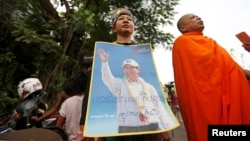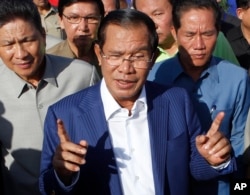Cambodian opposition leader Kem Sokha has spent more than 18 months in detention as of Sunday, with other opposition leaders decrying his case as politically motivated and arguing that his continued detention goes against Cambodian laws.
Sokha, the leader of the Cambodia National Rescue Party, was arrested on Sept. 3, 2017, on charges of treason, accused of conspiring with the United States to topple Cambodia's government. The evidence his accusers have presented so far is a publicly available video in which Sokha talks about receiving U.S. assistance for his political career. After more than a year in prison, he was released on bail but put under court supervision, practically amounting to house arrest. He is not allowed to leave the immediate vicinity of his house, speak to other opposition members – including his daughters – nor be in contact with foreigners.
Although Cambodian law only allows for a maximum of 18 months of pre-trial detention, which would have expired on Sunday, the court argues that he is technically on bail and can, therefore, be kept under court supervision indefinitely.
The leader of the now-dissolved CNRP, Sam Rainsy, in an email, told VOA he believed Rainsy would be released soon “because the government will not be able to defy the international community by maintaining his house arrest.”
Rainsy said he believes the government would not be able to survive if the European Union follows through with its threats to withdraw the preferential trade agreement Everything But Arms (EBA), and would, therefore, cave into the pressure.
About 40 percent of Cambodia’s exports go to the European Union, most of it under the EBA agreement.
CNRP Vice President Mu Sochua agreed, speculating that international pressure would force Prime Minister Hun Sen to release Kem Sokha, as she slammed his “treason” case as politically motivated.
But Prime Minister Hun Sen said on Monday that Kem Sokha would not be released, and Council of Minister's spokesperson Phay Siphan rejected accusations that the case was political.
“EBA cannot force the government to work against the court. It’s simple,” he told VOA. “Just remember we cannot do anything with the Kem Sokha [case]. Let the Kem Sokha case go through the court.”
While both Sochua and Rainsy believed that Kem Sokha could not be held indefinitely, Sochua said the 18 months he had spent in prison had an effect on the functioning of the party.
“I think what is really solid is that the spirit of the people [who] want to change, positive change remains unchanged," Sochua said. "What has changed also is that we have to rely more also on overseas Cambodians, we have to rely more on international [community], the donor community; what has changed also is that we are not able at all, at all, to be in the county, and to continue working, which hurts the poor, which hurts the voiceless,” she said.
Nonetheless, Sochua said, the CNRP leadership was “mobilizing inside the country.”
“We see it as a necessity. Otherwise, people will lose hope, people will be numb and live in fear.”
This, however, followed strictly non-violent means, she said. “The only way to make Cambodia a better place is through democratic change,” she said.
Both Sochua and Rainsy said they would be returning to the country soon. Sochua added that they would meet on Mar. 15 with a committee to discuss plans on when to return and how to ensure the safety of their supporters, who she said might go onto the streets if Rainsy returned.
“The plans are moving ahead” Sochua said, expressing concern that Rainsy, exiled since 2016 and facing a number of convictions in Cambodia, would be arrested upon his return.
Political analyst Meas Nee believes support for the opposition was still strong on the grassroots level, but that it was difficult to assess how many people still support the CNRP after it was dissolved.
He sees prospects for Kehm Sokha's release as slim. “As long as the government cannot succeed to restructure its current political system, then the CNRP remains a threat to them, and Kem Sokha perhaps will be in jail,” he said.






